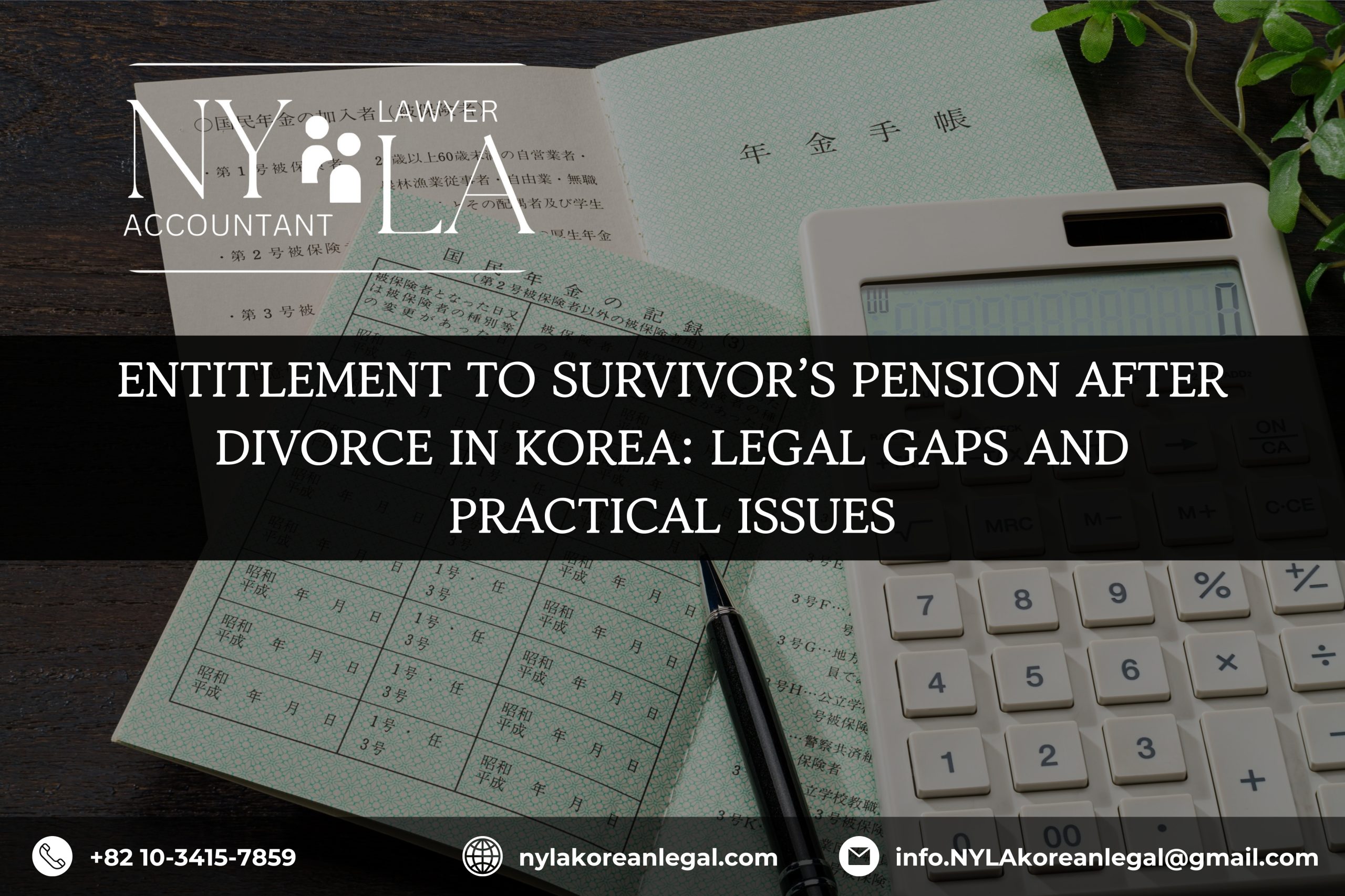The survivor’s pension is an essential social security scheme under the Korean legal system, designed to secure the livelihood of dependent family members upon the death of an employee. The primary beneficiaries include a spouse, children, parents, or persons in a direct caregiving relationship. However, it is noteworthy that a divorced spouse is entirely excluded from the scope of entitlement to this pension.
In Korean society, there has been a growing number of cases in which former spouses, even after divorce, continue to maintain an economic dependency through alimony obligations or shared responsibilities in raising their children. The fact that the current law does not recognize any entitlements for divorced spouses has given rise to considerable debate in academia and has raised questions regarding the fairness and adequacy of the existing social security system.
Summary
1. Current legal basis
1.1. Civil Code
According to the provisions of the Civil Code, a marital relationship is terminated upon the legal effect of divorce. As a necessary consequence, former spouses lose the legal status attached to marriage, including:
- The rights and obligations of spousal support;
- The statutory right of inheritance;
- Rights arising from a lawful marital relationship, including the entitlement to a survivor’s pension.
Accordingly, after divorce, a former spouse is no longer classified as a first-line heir together with the children
1.2. National Pension Act
The law provides that the survivor’s pension or death benefits shall be paid to the following persons:
- The lawful spouse of the deceased;
- Minor children or children who are incapacitated;
- Dependent parents;
- In the absence of the above, dependent siblings.
Within this list, a former spouse is not recognized as a lawful beneficiary.
1.3. Workers’ Compensation Act
When an employee dies as a result of a work-related accident, the Workers’ Compensation Act provides that survivor’s benefits shall be paid to the lawful spouse, children, and dependent parents. This approach is entirely consistent with the National Pension Act and likewise excludes former spouses.
1.4. Case law
In numerous cases, the Supreme Court of Korea has affirmed the principle that: divorce completely severs the marital relationship and the entitlement to social security benefits arising from it. Even if an ex-spouse is receiving alimony under a divorce judgment, this does not alter the legal nature of the matter: they are no longer a lawful spouse at the time of the worker’s death. Therefore, the right to survivor’s benefits is not recognized.

2. Practical application and emerging issues
2.1. Cases of economic dependents
A common reality is that many women, after divorce, do not have stable employment and sustain their livelihood through alimony or financial support from their former husbands. Upon the husband’s death, this source of income is terminated; however, the law provides no protective mechanism whatsoever. This results in former wives falling into severe financial hardship.
2.2. Cases of the custodial parent of a common child
Children are legally recognized as beneficiaries of the survivor’s pension; however, in practice, the custodial parent (most often the mother) bears the greatest financial burden. The law, however, grants entitlement solely to the child and does not extend it to the individual actually responsible for child-rearing. This creates a gap between the nominal entitlement of the child and the actual economic burden borne by the custodial parent.
2.3. Difficulties in Administrative Practice
In the course of disbursing survivor’s benefits, the insurance authority generally relies on the family register and marital records to determine eligible beneficiaries. Since former spouses lack legal status, the authority has no legal basis to approve their claims, even upon formal request. This has led to numerous cases evolving into protracted legal disputes, albeit without altering the outcome.
3. Domestic doctrinal perspectives
3.1. Perspective supporting the maintenance of the current principle
Some scholars emphasize the principle that “divorce constitutes the complete termination of the marital relationship,” and therefore, extending survivor’s benefits to former spouses would run counter to the very meaning of divorce. This perspective also raises concerns that recognizing such entitlement could give rise to conflicts of interest between the current spouse and the former spouse, complicating the allocation of benefits.
3.2. Critical perspectives and calls for expansion
Another viewpoint holds that the fundamental purpose of survivor’s benefits is to protect the livelihood of those who are dependent on the deceased, rather than merely safeguarding the marital relationship. Therefore, the complete exclusion of former spouses is considered overly rigid.
Scholars supporting this perspective argue that:
- When an alimony obligation established by the court still exists, the former spouse remains economically dependent in practice.
- In cases where the former spouse has primary custody of minor children, they bear the responsibility for the children’s living expenses. Failure to recognize their entitlement would result in inequity.
3.3. Scholarly gaps and controversies
The most significant point of controversy is whether survivor’s benefits should be understood as a right arising from the marital relationship or as a mechanism for protecting economically dependent persons. The former interpretation results in the exclusion of former spouses, whereas the latter opens the possibility of recognition in certain exceptional cases.
4. Conclusion
Under the current Korean legal system, former spouses are entirely excluded from entitlement to survivor’s benefits, based on the principle that the marital relationship is definitively terminated upon divorce. However, social reality shows that in many cases, former spouses continue to maintain economic dependence or bear responsibilities for raising their shared children. This incongruity has created a legal gap and has become a subject of intense debate within the scholarly community.
It can be seen that the issue of entitlement to survivor’s benefits after divorce is not merely a matter of legal technicality, but also reflects the tension between traditional legal principles and the need to protect social welfare in a modern context. This is a topic worthy of further study, particularly through the analysis of case law and the assessment of the suitability of the current system in light of changes in family structures and social life in Korea.
5. About NYLA – Korean Legal Office

■ NYLA – Your Trusted Legal Partner in Korea
At NYLA, we understand that the success of foreign businesses in Korea requires not only a solid business strategy but also reliable legal support. With a team of experienced Korean attorneys and legal professionals, NYLA provides tailored legal services for companies, investors, and individuals operating or planning to establish a presence in Korea.
We support our clients throughout the entire business journey with comprehensive services, including:
- Legal consultation on company establishment, taxation, and immigration;
- Advice on commercial real estate, franchising, and product distribution;
- Support in human resources, marketing, and business strategy.
In addition to legal advisory, NYLA also represents clients in civil litigation cases related to business, labor, marriage, family, and inheritance to ensure their rights and interests are fully protected.
■ Contact NYLA

If you’re a foreign business or individual looking for a reliable legal partner in Korea, NYLA is here to help. We are committed to delivering effective, practical, and personalized legal solutions for every client.
With a proven track record of assisting hundreds of international clients, our team is equipped to help you navigate complex legal challenges—whether it’s commercial disputes, contract issues, or foreign investment guidance.
Don’t let legal matters hold you back. Let NYLA be your trusted guide in the Korean market.
■ Get in touch with NYLA for expert legal support
| Website: https://nylakoreanlegal.com/
FB: https://www.facebook.com/nyla.koreanlegal Tiktok: https://www.tiktok.com/@nylakoreanlegal Youtube: https://www.youtube.com/@NYLA-xd8qx Email: info.NYLAkoreanlegal@gmail.com SĐT: +82 10-3415-7859 |
 |






















































